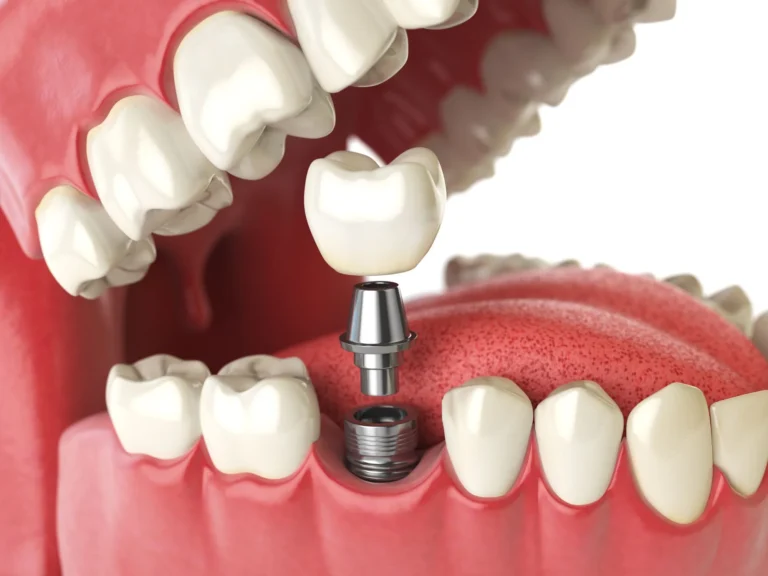
Dental implants are artificial tooth roots, typically made of titanium, that are surgically placed into the jawbone to support a replacement tooth, bridge, or denture. They offer a stable and long-lasting solution for people who have lost teeth due to injury, periodontal disease, or other reasons. Here’s a detailed overview of dental implants:
Components of Dental Implants
- Implant Fixture: The base that is surgically implanted into the jawbone, usually made of titanium.
- Abutment: A connector placed on top of the implant fixture to hold and support a crown or other type of dental prosthesis.
- Crown: The artificial tooth that attaches to the abutment and is designed to blend with your natural teeth.
Types of Dental Implants
- Endosteal Implants: These are the most common type and are placed directly into the jawbone. They are usually shaped like small screws, cylinders, or plates.
- Subperiosteal Implants: These are placed under the gum but on or above the jawbone. They are used for patients who do not have enough healthy jawbone and cannot undergo a bone augmentation procedure.
Procedure for Dental Implants
- Initial Consultation: Evaluation of dental and medical history, including X-rays or 3D images to assess the condition of the jawbone.
- Dental Implant Placement: The implant fixture is surgically placed into the jawbone. Healing time varies but typically takes several months to allow the implant to integrate with the bone (osseointegration).
- Abutment Placement: Once the implant is securely bonded with the bone, an abutment is attached to the implant fixture.
- Crown Placement: After the gums heal around the abutment, a custom-made crown is attached to the abutment.
Benefits of Dental Implants
- Durability: With proper care, implants can last many years, often a lifetime.
- Improved Appearance: They look and feel like natural teeth.
- Enhanced Comfort: They eliminate the discomfort of removable dentures.
- Improved Oral Health: They do not require altering adjacent teeth as a bridge does, preserving more of your natural teeth.
- Better Speech and Eating: They function like natural teeth, improving speech and chewing.
Risks and Considerations
- Infection: As with any surgery, there is a risk of infection at the implant site.
- Nerve Damage: Can cause pain, numbness, or tingling in natural teeth, gums, lips, or chin.
- Sinus Problems: In rare cases, dental implants placed in the upper jaw can protrude into the sinus cavities.
- Bone Loss: Over time, the jawbone around the implant may degrade.
Aftercare and Maintenance
- Good Oral Hygiene: Brushing, flossing, and regular dental check-ups are crucial.
- Avoiding Hard Foods: To prevent damage to the implants.
- Regular Dental Visits: To monitor the condition of the implants and overall oral health.
Advancements in Dental Implants
- Immediate Load Dental Implants: Allow for a temporary tooth to be placed on the same day as the implant.
- Mini Implants: Smaller in size and often used for stabilizing a lower denture.
- All-on-4 Implants: A technique where four implants support a full arch of replacement teeth.
Dental implants have revolutionized the way missing teeth are replaced, providing a robust, natural-looking solution that improves the quality of life for many individuals.

